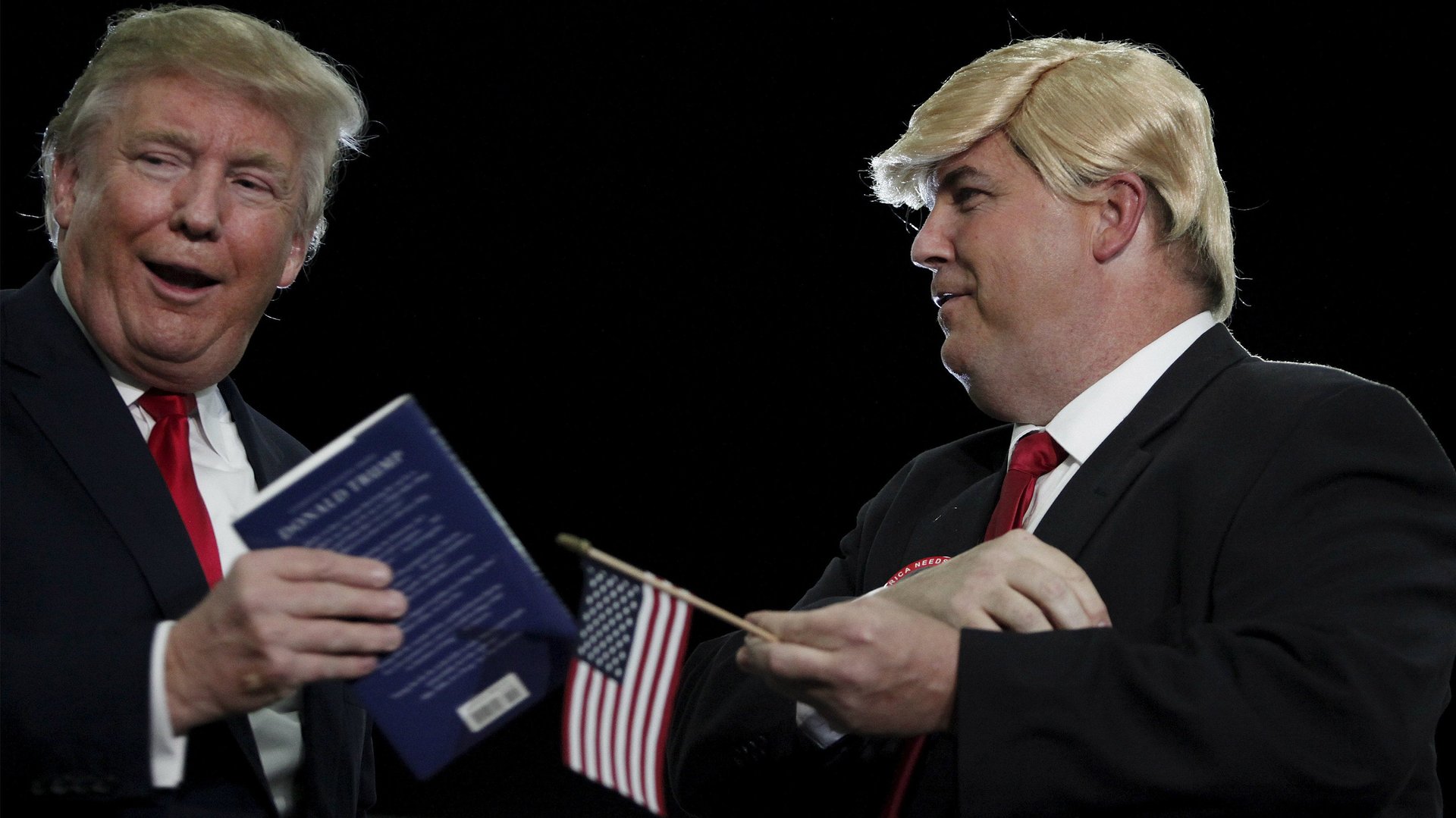Donald J. Trump, you’re no Winston Churchill
If all the Republican presidential primaries were held today, Donald Trump seems likely to win the party’s nomination, according to a new CBS/New York Times poll that confirms other recent surveys. He would then go on to lose the White House to Democrat Hillary Clinton.


If all the Republican presidential primaries were held today, Donald Trump seems likely to win the party’s nomination, according to a new CBS/New York Times poll that confirms other recent surveys. He would then go on to lose the White House to Democrat Hillary Clinton.
As long as it holds true, this dynamic will drive campaign tension over the next 11 months as Trump attempts to change the calculus, and Clinton tries to keep things smilingly as they are. But what sort of experience will this be for us observers? Judging by Trump’s performance to date, we’re looking at the nadir of humor in American political discourse. Yes, humor. While many of us started this campaign season laughing at Trump, some of his recent suggestions, especially his vow to ban Muslims from traveling to the US, are a lot less funny.
Even when it was possible to poke fun at Trump, we weren’t laughing along with his acid wit and quick tongue, but rather at his thin skin and ceaseless complaints of being wronged by anyone who wasn’t “nice” to him. If the CBS/NYT survey is an indicator, Trump supporters like his bombast. Yet his style could come back to bite him–not to mention the US and its allies–in the long-shot chance that he’s actually elected.
Nice, schmice
Historians of elections are keen to point out that politics are rarely if ever about being nice, and that the United States has had some of the greatest uncivility on record. Who for example can forget Democrat Stephen Douglas’s description of arch-foe Abraham Lincoln (a “hatchet-faced nutmeg dealer”)?
Yet even that insult had the hallmark of the literary cut—the straight-talking, tough-guy candidate carving up his opponent with panache appropriate to the highest office in the land. Such politicians scorn their opponents with better than “stupid” and “absolutely scum.”
In a normal political season, the following would go without saying, but let’s assume nothing this cycle: Communication is an important political skill. The well-spoken word can be crucial when you’re threatening war, and especially when you’re actually declaring it.
Ronald Reagan, who coined the phrase “Evil Empire” to describe the Soviet Union, was in a way the Trump of his day–for a long while, a lot of people, especially his opponents and leaders abroad, thought he was unhinged. Yet he managed the opening to Soviet leader Mikhail Gorbachev, partly with his tough-guy reputation, but also because his interlocutors couldn’t help but like him, a feat carried off in no small part because of his clever turns of phrase and humor.
In the 1930s, no one was tougher than Winston Churchill when it came to Hitler—which is why he was the obvious choice to succeed the Führer-appeasing Neville Chamberlain. Who can forget the British Bulldog’s ”we shall fight on the beaches” call to arms?
Such artisans cut to the quick. In the 1988 US vice presidential debate, Lloyd Bentsen, the Democratic nominee, listened patiently as his young Republican opponent, Dan Quayle, compared himself to John Kennedy, who had become president at just 43. Bentsen replied, “Senator, you’re no Jack Kennedy.” Quayle never recovered. Without resorting to Wikipedia, find anyone with any idea of Quayle’s activities since serving a single term under George H.W. Bush.
Fibbery, too, can be artful
Certainly politics is not above the well-timed or well-sculpted lie—fibbing in fact seems almost expected of effective national leaders. In 2000, George W. Bush pulled ahead in the race for the Republican presidential nomination when his campaign suggested that rival John McCain had fathered a black child out of wedlock.
So is that the correct context for the factual invention that we’re witnessing in the 2016 campaign? It’s hard to say, given that we’re still in the middle of it. But one does have a sense of voluminosity—a deluge of shameless lies, compound lies, and straight-faced lies, lies on national television, and, presumably, lies in private.
Trump has attempted to dominate the insults and lies space, but he’s had to fight hard for it. There was the impressive combination lie that he and Marco Rubio one-twoed in the Oct. 28 Republican debate, when both denied that Trump had ever called Rubio “Zuckerberg’s senator,” referring to Facebook founder Mark Zuckerberg. Seeing the artifice momentarily dupe Becky Quick, the CNBC questioner, Rubio doubled down, advancing an argument that the Zuckerberg “mistake” illustrated the media’s propensity to back Democrats. It was a score for Rubio, who has come closest among the Republicans as an artful cutter. But the lies? Few seem of the wily sort.
And all the challengers have so far fallen short in taking on Trump personally. Is there no poetry to be found in Trump’s age (69), shape (paunchy), accent (Noo Yawk), or grooming style (bouffant)?
After all, the roots of the appellation “Churchillian” aren’t only that the British leader was eloquent in Parliament or contemptuous toward Hitler. As he once said of his main rival: “An empty cab pulled up to Downing Street. Clement Attlee got out.”